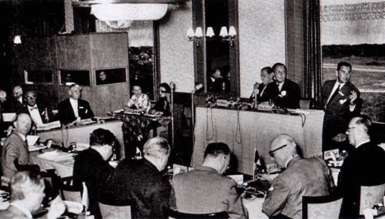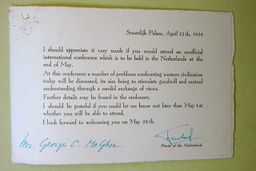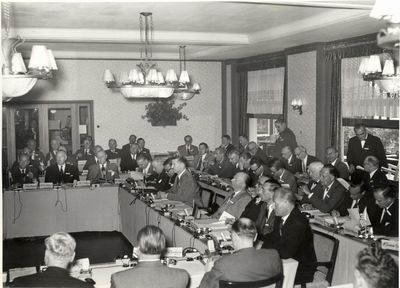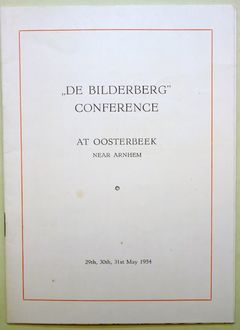Difference between revisions of "Bilderberg/1954"
m (Text replacement - "|constitutes=meeting" to "|constitutes=Bilderberg/Meeting") |
|||
| (26 intermediate revisions by the same user not shown) | |||
| Line 3: | Line 3: | ||
|start=29 May 1954 | |start=29 May 1954 | ||
|end=31 May 1954 | |end=31 May 1954 | ||
| + | |description=The first Bilderberg meeting, attended by 68 men from Europe and the US, including 20 businessmen, 25 politicians, 5 financiers & 4 academics. | ||
| + | |alchetron=https://alchetron.com/1954-Bilderberg-Conference-1431697-W | ||
|perpetrators=Bilderberg/Steering committee | |perpetrators=Bilderberg/Steering committee | ||
| − | |constitutes= | + | |constitutes=Bilderberg/Meeting |
| − | |image=Bilderberg_1954. | + | |image=Bilderberg_1954.jpg |
| + | |image_width=400px | ||
|locations=Hotel Bilderberg, Oosterbeek, Netherlands | |locations=Hotel Bilderberg, Oosterbeek, Netherlands | ||
|image_caption=The 1954 Meeting | |image_caption=The 1954 Meeting | ||
| − | | | + | |nonparticipants= Antoine Pinay, Panagiotis Pipinelis, Alcide de Gasperi, P. Quaroni, P. H. Teitgen, Guy Mollet |
| − | + | |participants=George Barry Bingham, Hugh Gaitskell, H. M. Hirschfeld, Guy Mollet, Paul H. Nitze, Etienne de la Vallee Poussin, David Rockefeller, J. D. Zellerbach, Robert Andre, Ralph Assheton, G. De Beaumont, Pierre Bonvoisin, Robert Boothby, Max Brauer, Raffaele Cafiero, Walker L. Cisler, Gardner Cowles, Clement Davies, Jean Drapier, Roger Duchet, Maurice Faure, John H. Ferguson, John Foster, Oliver Franks, Gerhard P. Th. Geyer, Colin Gubbins, Dennis Healey, H. John Heinz II, Leif Høegh, C. D. Jackson, Nelson Dean Jay, P. Kanellopoulos, V. J. Koningsberger, Ole Bjørn Kraft, P. M. A. Leverkuehn, Giovanni F. Malagodi, Finn Moe, H. Montgomery Hyde, Roger Motz, Rudolf Mueller, George C. McGhee, George Nebolsine, H. Oosterhuis, Cola G. Parker, George Perkins Jr, Harry Pilkington, Alberto Pirelli, Ludwig Rosenberg, Paolo Rossi, Denis de Rougemont, Paul Rijkens, Ernst Georg Schneider, Joseph P. Spang, M. P. L. Steenberghe, Terkel Terkelsen, Herbert L. G. Tingsten, H. Troeger, Vittorio Valletta, Andre Voisin, M. Waldenstrom, H. F. van Walsem, Jean Willems, Thomas Williamson | |
| + | |witnesses=B. H. M. Vlekke, W. Veenstra, E. G. Focke, G. E. Overweg, J. Pomian | ||
| + | }} | ||
| + | The '''1954 Bilderberg Meeting''' was the first [[Bilderberg]] meeting. It had participants from [[Europe]]an countries and the [[United States]]. All were male. {{Bilderberg summary}} It was held at the Bilderberg Hotel in Oosterbeek, the [[Netherlands]]. The next one was the [[Bilderberg/1955 March|1955 March]] meeting. | ||
| + | |||
| + | {{SMWQ | ||
| + | |format= | ||
| + | |text=Americans saw that firm Western action in [[1953 Iranian coup|Persia]], [[Berlin airlift|Berlin]], and [[Korean War|Korea]] had produced successful results and they therefore believed in continuing a firm policy. | ||
| + | |subjects=Berlin airlift, Korean War, 1953 Iranian coup | ||
| + | |constitutes= | ||
| + | |source_URL=https://wikispooks.com/wiki/File:BilderbergConferenceReport1954.pdf | ||
| + | |source_title=1954 Bilderberg report | ||
| + | |date=1954 | ||
}} | }} | ||
| − | |||
==Origins== | ==Origins== | ||
| − | In August 1956 [[Józef Retinger]] completed an account of how the group was set up, in which he tracks the group's origins to 1952. He reportedly approached H.R.H. [[Prince Bernhard]], Dr [[Paul Rykens]] and [[Paul van Zeeland]] "with the suggestion that we should organize some unofficial and private meetings to discuss the difficulties and dangers which were causing us so much anxiety. To these meetings we would invite influential and reliable people who carried the respect of those working in the field of national and international affairs and whose personal contact with men at the summit of public activity could help to smooth over these difficulties."<ref name=ret-bb-hist>[[File:bilderberg-history-1956.pdf]]</ref> On their advice, he approached a larger group of his friends, who met in Paris on 25 September 1952 and "discussed what could be done to improve American-European relations and on the initiative of M. van | + | [[image:Bilderberg_1954_chair.gif|thumbnail|left|[[Prince Bernhard]] chairs the conference|385px]] |
| − | Zeeland we decided to set up a corresponding group in the United States."<ref name=ret-bb-hist/> Retinger went to USA in November that year and organised a US contingent, under [[John Coleman]]. Together they organised the list of guests for the 1954 conference. | + | In August 1956 [[Józef Retinger]] completed an account of how the group was set up, in which he tracks the group's origins to 1952. He reportedly approached H.R.H. [[Prince Bernhard]], Dr [[Paul Rykens]] and [[Paul van Zeeland]] "with the suggestion that we should organize some unofficial and private meetings to discuss the difficulties and dangers which were causing us so much anxiety. To these meetings we would invite influential and reliable people who carried the respect of those working in the field of national and international affairs and whose personal contact with men at the summit of public activity could help to smooth over these difficulties."<ref name=ret-bb-hist>[[File:bilderberg-history-1956.pdf]]</ref> On their advice, he approached a larger group of his friends, who met in [[Paris]] on 25 September 1952 and "discussed what could be done to improve American-European relations and on the initiative of M. van Zeeland we decided to set up a corresponding group in the United States."<ref name=ret-bb-hist/> Retinger went to USA in November that year and organised a US contingent, under [[John Coleman]]. Together they organised the list of guests for the 1954 conference. |
| + | |||
| + | {{SMWQ | ||
| + | |format=inline | ||
| + | |text=Finally, in view of the desire expressed by the majority of the participants in Bilderberg, and on the invitation of the American members, it was decided that a similar conference should be convened in the U.S.A., time and place to be decided upon later. | ||
| + | |subjects= | ||
| + | |constitutes= | ||
| + | |source_URL=https://wikispooks.com/wiki/File:BilderbergConferenceReport1954.pdf | ||
| + | |source_title=1954 Bilderberg report | ||
| + | |date=1954 | ||
| + | }} | ||
==Invitations== | ==Invitations== | ||
| − | [[Image:Bilderberg_1954_invitation.jpg|left|thumbnail| | + | [[Image:Bilderberg_1954_invitation.jpg|left|thumbnail|256px|[[George C. McGhee]]'s invitation to the first Bilderberg]] |
| − | In mid April, 1954, the invited guests were sent personal invitations from Soetdijk Palace to "an unofficial international conference which is to be held in the Netherlands at the end of May" for "a candid exchange of views". They were signed by | + | [[image:Bilderberg_1954_attendees_list.jpg|right|240px]] |
| + | In mid April, 1954, the invited guests were sent personal invitations from Soetdijk Palace to "an unofficial international conference which is to be held in the Netherlands at the end of May" for "a candid exchange of views". They were signed by [[Prince Bernhard]]. | ||
==Location== | ==Location== | ||
| − | + | The "Hotel De Bilderberg" is located in Oosterbeek, a small town near Arnhem, which was the site of a major [[World War II]] battle. Bilderberg researcher [[Tony Gosling]] has suggested that this may have been a deliberate choice, an indirect reference to [[Operation Market Garden]], which he sees as the deceit which deliberately prolonged [[World War II]]. | |
| − | The "Hotel De Bilderberg" is located in Oosterbeek, a small town near Arnhem, which was the site of a major [[World War II]] battle. Bilderberg researcher [[Tony Gosling]] has suggested that this may have been a deliberate choice, | ||
==Meetings== | ==Meetings== | ||
There were morning and afternoon meetings on all 3 days. On Saturday, 29th May, 10:00-13:00 and then 15:00-18:00. On Sunday, 11:00-13:00 and then 15:00-18:00. On Monday, 10:00-13:00 and then 14:30-18:00. "For reasons of convenience only the English and French languages" were used. The conference room was equipped for simultaneous interpretation into English and French. Secretaries were "made available to the participants on request to the Secretariat."<ref name=roster>[[File:Roster_Bilderberg_Meetings.pdf]]</ref> | There were morning and afternoon meetings on all 3 days. On Saturday, 29th May, 10:00-13:00 and then 15:00-18:00. On Sunday, 11:00-13:00 and then 15:00-18:00. On Monday, 10:00-13:00 and then 14:30-18:00. "For reasons of convenience only the English and French languages" were used. The conference room was equipped for simultaneous interpretation into English and French. Secretaries were "made available to the participants on request to the Secretariat."<ref name=roster>[[File:Roster_Bilderberg_Meetings.pdf]]</ref> | ||
| − | ==Notes On Discussion | + | ==Notes On Discussion== |
Subsequent Bilderberg meetings issued a formal conference report, but no such is known to exist for the original Bilderberg conference. Instead, a set of typed notes records 21 pages of opinions expressed at the meeting. These notes are exceptional in that they attribute names to the comments they record. Concern about privacy probably caused this policy to be amended, to that subsequent conference reports instead attributed comments instead to "An American", "A German" etc. | Subsequent Bilderberg meetings issued a formal conference report, but no such is known to exist for the original Bilderberg conference. Instead, a set of typed notes records 21 pages of opinions expressed at the meeting. These notes are exceptional in that they attribute names to the comments they record. Concern about privacy probably caused this policy to be amended, to that subsequent conference reports instead attributed comments instead to "An American", "A German" etc. | ||
| − | The Bilderberg meetings website (which is known to have | + | ==Non-attendance== |
| − | # The attitude towards communism and the Soviet Union | + | According to the report, [[Antoine Pinay]], [[Panagiotis Pipinelis]], [[Alcide de Gasperi]] and [[P. Quaroni]] did not attend due to illness and |
| + | [[P. H. Teitgen]] & [[Guy Mollet]] were both marked "unable to attend owing to an unforeseen and urgent meeting of his party regarding the EDC".<ref name="BilderbergConferenceReport1954">[[file:BilderbergConferenceReport1954.pdf]]</ref> | ||
| + | |||
| + | ==Recording== | ||
| + | {{YouTubeVideo | ||
| + | |code=fZEatAE0iS4 | ||
| + | |align=left | ||
| + | |caption=The 1954 conference | ||
| + | }}An audio recording of [[Prince Bernhard]] opening the conference was made, which was posted on [[YouTube]]. It is occasionally taken down due to claims of copyright infringement, but remains available. Photos were also taken, but are unknown for later conferences. | ||
| + | |||
| + | ===Agenda=== | ||
| + | The Bilderberg meetings website (which is known to have omitted certain items)<ref>See, for example, the [[1993 Bilderberg]]</ref> summarised the agenda as follows: | ||
| + | # The attitude towards communism and the [[Soviet Union]] | ||
# The attitude towards dependent areas and peoples overseas | # The attitude towards dependent areas and peoples overseas | ||
# The attitude towards economic policies and problems | # The attitude towards economic policies and problems | ||
# The attitude towards European integration and the European Defence Community | # The attitude towards European integration and the European Defence Community | ||
| + | |||
| + | The report was leaked online.<ref name="BilderbergConferenceReport1954"/> | ||
{{SMWDocs}} | {{SMWDocs}} | ||
==References== | ==References== | ||
{{reflist}} | {{reflist}} | ||
Latest revision as of 19:12, 18 November 2023
The 1954 Bilderberg Meeting was the first Bilderberg meeting. It had participants from European countries and the United States. All were male. The 63 guests included 20 business executives, 22 politicians, 4 financiers, 2 editors/journalists and 3 academics. It was held at the Bilderberg Hotel in Oosterbeek, the Netherlands. The next one was the 1955 March meeting.
“Americans saw that firm Western action in Persia, Berlin, and Korea had produced successful results and they therefore believed in continuing a firm policy.”
(1954) 1954 Bilderberg report [1]
Contents
Origins

In August 1956 Józef Retinger completed an account of how the group was set up, in which he tracks the group's origins to 1952. He reportedly approached H.R.H. Prince Bernhard, Dr Paul Rykens and Paul van Zeeland "with the suggestion that we should organize some unofficial and private meetings to discuss the difficulties and dangers which were causing us so much anxiety. To these meetings we would invite influential and reliable people who carried the respect of those working in the field of national and international affairs and whose personal contact with men at the summit of public activity could help to smooth over these difficulties."[2] On their advice, he approached a larger group of his friends, who met in Paris on 25 September 1952 and "discussed what could be done to improve American-European relations and on the initiative of M. van Zeeland we decided to set up a corresponding group in the United States."[2] Retinger went to USA in November that year and organised a US contingent, under John Coleman. Together they organised the list of guests for the 1954 conference.
“Finally, in view of the desire expressed by the majority of the participants in Bilderberg, and on the invitation of the American members, it was decided that a similar conference should be convened in the U.S.A., time and place to be decided upon later.” [3]
Invitations

In mid April, 1954, the invited guests were sent personal invitations from Soetdijk Palace to "an unofficial international conference which is to be held in the Netherlands at the end of May" for "a candid exchange of views". They were signed by Prince Bernhard.
Location
The "Hotel De Bilderberg" is located in Oosterbeek, a small town near Arnhem, which was the site of a major World War II battle. Bilderberg researcher Tony Gosling has suggested that this may have been a deliberate choice, an indirect reference to Operation Market Garden, which he sees as the deceit which deliberately prolonged World War II.
Meetings
There were morning and afternoon meetings on all 3 days. On Saturday, 29th May, 10:00-13:00 and then 15:00-18:00. On Sunday, 11:00-13:00 and then 15:00-18:00. On Monday, 10:00-13:00 and then 14:30-18:00. "For reasons of convenience only the English and French languages" were used. The conference room was equipped for simultaneous interpretation into English and French. Secretaries were "made available to the participants on request to the Secretariat."[4]
Notes On Discussion
Subsequent Bilderberg meetings issued a formal conference report, but no such is known to exist for the original Bilderberg conference. Instead, a set of typed notes records 21 pages of opinions expressed at the meeting. These notes are exceptional in that they attribute names to the comments they record. Concern about privacy probably caused this policy to be amended, to that subsequent conference reports instead attributed comments instead to "An American", "A German" etc.
Non-attendance
According to the report, Antoine Pinay, Panagiotis Pipinelis, Alcide de Gasperi and P. Quaroni did not attend due to illness and P. H. Teitgen & Guy Mollet were both marked "unable to attend owing to an unforeseen and urgent meeting of his party regarding the EDC".[5]
Recording
| The 1954 conference |
An audio recording of Prince Bernhard opening the conference was made, which was posted on YouTube. It is occasionally taken down due to claims of copyright infringement, but remains available. Photos were also taken, but are unknown for later conferences.
Agenda
The Bilderberg meetings website (which is known to have omitted certain items)[6] summarised the agenda as follows:
- The attitude towards communism and the Soviet Union
- The attitude towards dependent areas and peoples overseas
- The attitude towards economic policies and problems
- The attitude towards European integration and the European Defence Community
The report was leaked online.[5]
Known Participants
All 63 of the participants already have pages here:
| Participant | Description |
|---|---|
| Robert André | Attended the first Bilderberg and 2 more, president of the "Syndicat de Petrole" |
| Ralph Assheton | Lord Clitheroe, Chairman of the Conservative Party in the 1940s, attended 2 Bilderbergs in the 1950s. |
| Guerin De Beaumont | Attended the first Bilderberg as Secretary of State for Foreign Affairs in charge of the European Defence Community. Made French Minister of Justice soon after. Died in 1955. |
| Barry Bingham | Kentucky media owner who collaborated with British Security Coordination. Attended 3 Bilderbergs in the 1950s. Ran the Marshall Plan in France in 1949. |
| Pierre Bonvoisin | Attended the first Bilderberg and three more. Société Générale de Belgique. Councilor to King Baudouin. Father of Benoît de Bonvoisin |
| Robert Boothby | British politician and UK deep state operative, Clermont Set, Bilderberg |
| Max Brauer | Mayor of Hamburg. One of a dozen men whom Józef Retinger consulted when setting up the Bilderberg |
| Raffaele Cafiero | Italian monarchist politician who attended two Bilderbergs in the 1950s |
| Walker Cisler | As well as the first Bilderberg, he attended the next four, and 3 more in the early 1960s, US businessman |
| Gardner Cowles | US media mogul involved with a number of CIA-front organizations. Attended the 1954 Bilderberg Conference. |
| Clement Davies | Attended the first Bilderberg as Leader of the UK Liberal Party |
| Jean Drapier | Principal Private Secretary to Belgian Prime Minister Paul-Henri Spaak, went to 3 of the first 4 Bilderbergs |
| Roger Duchet | French politician who attended the first Bilderberg in 1954 |
| Maurice Faure | French politician who co-signed the Treaty of Rome for France in 1957. |
| John Ferguson | US lawyer, attended the first Bilderberg and 7 others in the 1950s. US Ambassador to Morocco 1962-64 |
| John Foster | US Nuclear physicist who attended the first Bilderberg and two more. |
| Oliver Franks | Bilderberg UK Ambassador to the US, 'One of the founders of the postwar world'. |
| Hugh Gaitskell | A UK Labour politician who reportedly died of a rare illness in hospital. |
| Gerhard P. Th. Geyer | Esso director who attended the 1st and 4th Bilderbergs |
| Colin Gubbins | Bilderberg invitee and spook |
| Denis Healey | Bilderberg Steering committee member, who attended 23 Bilderberg meetings. |
| Hans Hirschfeld | Dutch economist/diplomat. Rapporteur in the attendance list of the first Bilderberg. |
| H. Montgomery Hyde | Spooky UK politician and lawyer who attended the first Bilderberg and one more. |
| Leif Høegh | Bilderberg Steering committee, as was his son |
| H. John Heinz II | 34 Bilderberg meetings, Bilderberg Steering & Advisory Committees |
| C. D. Jackson | OSS, US Deep sate operative, first Bilderberg |
| Nelson Dean Jay | David Rockefeller said: “Dean Jay is important, if for no other reason, because he was one of the ten Americans to be invited to the first Bilderberg Conference.” |
| George Perkins Jr | US diplomat who went to the first and fourth Bilderbergs. US Permanent Representative to NATO in the 1950s. Died in January 1960. |
| Panagiotis Kanellopoulos | Attended the first Bilderberg as Greek Defence Minister and former Greek Prime Minister. Also attended the 1956 Bilderberg. |
| V. J. Koningsberger | Dutch academic who attended the first Bilderberg meeting |
| Ole Bjørn Kraft | A Danish conservative politician whom Józef Retinger consulted when setting up the Bilderberg group. WACL |
| Paul Leverkuehn | German politician who went to the first Bilderberg and fourth Bilderbergs |
| Giovanni Malagodi | Italian liberal politician and supporter of European unity under American guiding hand. Attended the first Bilderberg and 8 others. |
| George McGhee | US ambassador, spook, Committee on the Present Danger, 12 Bilderbergs in the 1950s and 60s. |
| Finn Moe | Transatlantic and pro-EU Norwegian politician who attended the First Bilderberg and two more in the 1950s |
| Guy Mollet | One of a dozen men whom Józef Retinger consulted when setting up the Bilderberg group |
| Roger Motz | Belgian politician who attended 4 Bilderberg meetings in the 1950s, including the first one. |
| Rudolf Mueller | Consulted by Józef Retinger when setting up the Bilderberg group |
| George Nebolsine | CFR, Russian born naturalised US lawyer who attended all Bilderberg meetings until his death the day after the 1964 Bilderberg. |
| Paul Nitze | US deep politician, hawkish United States Deputy Secretary of Defense. |
| Henk Oosterhuis | Attended the first Bilderberg as President of the Netherlands Federation of Trade Unions, and also the 1956 Bilderberg |
| Cola Parker | US businessman and John Birch Society leader who attended the 1st and 4th Bilderbergs |
| Harry Pilkington | Attended the first Bilderberg as President of the Federation of British Industries, and two more in the 1950s |
| Alberto Pirelli | Italian businessman who attended the first Bilderberg and 7 others up to 1963. |
| Etienne de la Vallee Poussin | Belgian politician who attended the first Bilderberg and three more in the 1950s |
| David Rockefeller | US deep politician. CFR founder. Only person to attend over 50 Bilderberg meetings. |
| Ludwig Rosenberg | German-Jewish trade unionist. Worked in the International Department of the British Foreign Office during World War 2 during exile. Attended two more Bilderbergs in the 1950s after the first one. Leader of the German Trade Union Confederation 1962-1969. |
| Paolo Rossi | President of Antimafia Commission, attended the first Bilderberg and the 1956 Bilderberg |
| Denis de Rougement | Attended the first 4 Bilderbergs. Promoted European federalism |
| Paul Rykens | Dutch businessman and friend of Józef Retinger who was initially consulted on the founding of the Bilderberg Group |
| ... further results | |
Witnesses
| Witness | Description |
|---|---|
| E. G. Focke | In attendance at the first Bilderberg and two further Bilderbergs |
| G. E. Overweg | Unidentified Dutchman who was "in attendance" at the first two Bilderbergs |
| John Pomian | Multi-Bilderberg Polish nobleman who settled in the UK |
| W. Veenstra | A director of the secretariat who was "in attendance" at the March 1955 Bilderberg. |
| B. H. M. Vlekke | Dutch academic who did propaganda work when in exile in the United States during WW2. In attendance at the first Bilderberg 1954. |

